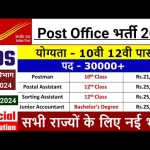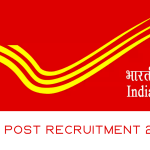Post office recruitment involves the hiring process for various positions within the postal service. These positions range from mail carriers and clerks to administrative roles and technical positions.The recruitment process for the India Post Office typically involves several stages, designed to ensure that candidates meet the required qualifications and are capable of performing the duties associated with their positions.
India Post offers a wide range of job opportunities across different levels and roles. Below is a detailed overview of the various types of job opportunities, including eligibility, educational qualifications, salary, and age limits for each post:
Group ‘A’ and Group ‘B’ Posts
Indian Postal Service (IPoS)
- Eligibility: Selection through the Civil Services Examination conducted by UPSC.
- Educational Qualification: A bachelor’s degree in any discipline.
- Age Limit: 21 to 32 years (relaxation as per government norms).
- Salary: Pay Level 10 to 14 (INR 56,100 to INR 2,25,000) plus allowances.
Senior Time Scale (STS) and Junior Time Scale (JTS)
- Eligibility: Promotions or direct recruitment via UPSC exams.
- Educational Qualification: A bachelor’s degree in any discipline.
- Age Limit: 21 to 32 years (relaxation as per government norms).
- Salary: Pay Level 10 to 12 (INR 56,100 to INR 1,77,500) plus allowances.
Assistant Superintendent of Posts (ASP) and Postal Service Group ‘B’
- Eligibility: Departmental exams and promotions.
- Educational Qualification: A bachelor’s degree in any discipline.
- Age Limit: Typically up to 40 years for departmental candidates.
- Salary: Pay Level 7 to 9 (INR 44,900 to INR 1,42,400) plus allowances.
Group ‘C’ Posts
- Postal Assistants (PA) and Sorting Assistants (SA)
- Eligibility: Competitive examination conducted by India Post.
- Educational Qualification: 10+2 or equivalent from a recognized board.
- Age Limit: 18 to 27 years (relaxation as per government norms).
- Salary: Pay Level 4 (INR 25,500 to INR 81,100) plus allowances.
- Postmen and Mail Guards
- Eligibility: Competitive examination.
- Educational Qualification: Matriculation (10th pass) from a recognized board.
- Age Limit: 18 to 27 years (relaxation as per government norms).
- Salary: Pay Level 3 (INR 21,700 to INR 69,100) plus allowances.
- Multi-Tasking Staff (MTS)
- Eligibility: Competitive examination.
- Educational Qualification: Matriculation (10th pass) from a recognized board.
- Age Limit: 18 to 25 years (relaxation as per government norms).
- Salary: Pay Level 1 (INR 18,000 to INR 56,900) plus allowances.
Gramin Dak Sevaks (GDS)
- Branch Postmaster (BPM)
- Eligibility: Merit list based on 10th standard marks.
- Educational Qualification: Matriculation (10th pass) from a recognized board.
- Age Limit: 18 to 40 years (relaxation as per government norms).
- Salary: INR 12,000 to INR 14,500 per month.
- Assistant Branch Postmaster (ABPM)
- Eligibility: Merit list based on 10th standard marks.
- Educational Qualification: Matriculation (10th pass) from a recognized board.
- Age Limit: 18 to 40 years (relaxation as per government norms).
- Salary: INR 10,000 to INR 12,000 per month.
- Dak Sevaks
- Eligibility: Merit list based on 10th standard marks.
- Educational Qualification: Matriculation (10th pass) from a recognized board.
- Age Limit: 18 to 40 years (relaxation as per government norms).
- Salary: INR 10,000 to INR 12,000 per month.
General Notes
- Age Relaxation: Age relaxation is typically provided for candidates belonging to SC/ST/OBC/PWD/Ex-Servicemen categories as per government norms.
- Allowances: In addition to the basic pay, employees are entitled to various allowances like Dearness Allowance (DA), House Rent Allowance (HRA), and Transport Allowance (TA).
- Promotions: Employees can progress to higher positions through departmental examinations and promotions based on their performance and seniority.
Recruitment List
- Post office government job 10th pass [ 2023 ]
- Skilled Artisan Vacancy [ 2018 ]
- Gramin Dak Sevak [ 2018 ]
- Postal /Sorting Assistant [ 2018 ]
- Gov Job For Post Man / Mail Guard [ 2015 ]
- Recruitment For Postman & Mail Guard [ 2015 ]
Application Process for Post Office Recruitment
The application process for post office recruitment in India generally involves several key steps. Here’s a detailed breakdown:
1. Notification
The recruitment process begins with the release of an official notification by the India Post. This notification includes details about the number of vacancies, job roles, eligibility criteria, important dates, and the application procedure. Notifications are published on the official India Post website and other employment news portals.
2. Checking Eligibility
Candidates must ensure they meet the eligibility criteria specified in the notification. Common criteria include:
- Educational Qualification: Minimum of 10th standard (Matriculation) from a recognized board.
- Age Limit: Typically between 18 to 40 years. Age relaxations may apply for reserved categories (SC/ST/OBC/PwD).
- Other Requirements: Depending on the position, candidates might need to have specific skills or qualifications, such as computer knowledge or cycling skills.
3. Registration
Candidates need to register on the official India Post recruitment portal. Here are the general steps:
- Visit the Official Website: Go to the India Post recruitment website.
- Create an Account: Register by providing basic details such as name, email, and phone number.
- Generate Registration ID and Password: Upon successful registration, candidates receive a unique registration ID and password.
4. Application Form
After registration, candidates need to fill out the online application form:
Login: Use the registration ID and password to log in.
Fill Personal Details: Enter personal information, educational qualifications, and other required details.
Upload Documents: Upload scanned copies of necessary documents, such as:
- Passport-sized photograph
- Signature
- Educational certificates
- Identity proof (Aadhaar card, PAN card, etc.)
- Caste certificate (if applicable)
5. Application Fee
Pay the application fee, if applicable. Fee payment can usually be done through:
- Online Mode: Credit card, debit card, or net banking.
- Offline Mode: Through a challan at designated post offices.
6. Submission
After completing the form and paying the fee, review all details carefully and submit the application. It’s advisable to take a printout of the application form and payment receipt for future reference.
7. Admit Card
Candidates who successfully submit their applications will receive an admit card for the examination (if applicable). The admit card is generally available for download from the official website.
8. Selection Process
The selection process varies by position and might include:
- Written Examination: For certain posts like Postal Assistant, Sorting Assistant, etc.
- Merit List: For Gramin Dak Sevak (GDS) and other similar posts, selection is often based on the merit of the 10th standard marks.
- Interview/Document Verification: Some positions may require an interview or document verification.
9. Result
Results are declared on the official website. Candidates can check their results by logging into their accounts. The final list of selected candidates is published, and those selected are contacted for further joining formalities.
10. Joining and Training
Selected candidates receive appointment letters with details about the joining date and location. They may also undergo training as per the job requirements before being posted to their respective roles.
[next30_jobs]
Selection Procedure for Post Office Recruitment
The selection procedure for Post Office recruitment generally involves several stages to ensure that the candidates are qualified and suitable for the roles. While the specific process may vary depending on the country and the position applied for, here’s a general overview:
- Notification of Vacancies: The first step is the announcement of job vacancies by the Postal Department. This notification includes details such as the number of vacancies, eligibility criteria, application process, and important dates.
- Application Submission: Interested candidates need to submit their applications as per the guidelines provided in the official notification. This typically involves filling out an application form with personal details, educational qualifications, and other relevant information. Sometimes, candidates may also need to pay an application fee.
- Admit Card Issuance: After the application submission deadline, eligible candidates receive admit cards or hall tickets for the written examination or other selection tests. The admit card contains details such as exam date, time, venue, and instructions for the candidates.
- Written Examination: Most Post Office recruitment processes include a written examination to assess the candidates’ knowledge, aptitude, and skills related to the job role. The exam pattern may vary depending on the position and may include multiple-choice questions, descriptive questions, or both.
- Skill Test/Typing Test: For certain positions, such as postal assistants or sorting assistants, candidates may need to undergo a skill test or typing test to evaluate their proficiency in typing, data entry, or other relevant skills.
- Interview (if applicable): Candidates who qualify in the written examination and skill test may be called for a personal interview. The interview aims to assess the candidate’s suitability for the job role, communication skills, and other relevant attributes.
- Document Verification: After the interview (if applicable), candidates who are provisionally selected need to undergo document verification. They are required to submit original documents/certificates to authenticate the information provided in the application form.
- Final Selection and Appointment: Based on the performance in all stages of the selection process and subject to document verification, the final selection list is prepared. Selected candidates receive offer letters and are appointed to the respective positions in the Post Office.
Exam Pattern and Syllabus for Post Office Recruitment
The exam pattern and syllabus for Post Office recruitment can vary depending on the specific position you’re applying for, as well as the organization conducting the recruitment. However, I can provide a general overview of what you might expect:
Exam Pattern:
- Post Office recruitment exams generally consist of multiple-choice questions (MCQs).
- The exam may be conducted in multiple stages, including a preliminary exam and a mains exam.
- There may be negative marking for incorrect answers, so it’s essential to answer only when you’re confident.
Syllabus: The syllabus may vary based on the specific job role, but here are some common topics that are often covered:
General Awareness:
- Current Affairs (National and International)
- Indian History
- Geography
- Indian Polity and Constitution
- Indian Economy
- Science and Technology
- Books and Authors
- Awards and Honors
- Important Days
English Language:
- Reading Comprehension
- Grammar (Parts of Speech, Tenses, Articles, Prepositions, Conjunctions, etc.)
- Vocabulary (Synonyms, Antonyms, One-word Substitution, Idioms & Phrases, etc.)
- Sentence Rearrangement
- Error Spotting
Quantitative Aptitude:
- Number System
- Simplification
- Percentage
- Ratio and Proportion
- Average
- Profit and Loss
- Simple and Compound Interest
- Time and Work
- Time, Speed, and Distance
- Data Interpretation
Reasoning Ability:
- Analogy
- Classification
- Series
- Coding-Decoding
- Blood Relations
- Direction and Distance
- Alphabet and Number Series
- Logical Reasoning
- Non-Verbal Reasoning (Mirror Images, Embedded Figures, etc.)
Computer Knowledge: (for certain positions)
- Basic Computer Fundamentals
- MS Office (Word, Excel, PowerPoint)
- Internet and Email
- Computer Abbreviations
General Mathematics: (for certain positions)
- Arithmetic
- Algebra
- Geometry
- Trigonometry
Descriptive Test: Some Post Office recruitment exams may also include a descriptive test, which could involve:
- Essay Writing
- Letter/Application Writing
Challenges and Rewards of a Career in India Post
Challenges:
- Workload and Time Management: Postal workers often have to manage heavy workloads, especially during peak seasons like festivals or elections. Sorting, delivering, and managing mail can be time-consuming and require efficient time management skills.
- Physical Demands: The job can be physically demanding, especially for roles like postmen/mail guards and multi-tasking staff (MTS), which involve extensive walking, lifting, and carrying of heavy parcels and mailbags.
- Adverse Weather Conditions: Postal workers are required to work outdoors regardless of weather conditions. They may have to deliver mail during extreme heat, heavy rain, or cold winters, which can be challenging and sometimes hazardous.
- Safety Concerns: Postal workers may face safety risks while working, such as encountering aggressive dogs, navigating through traffic, or delivering mail in unsafe neighborhoods, posing potential threats to their well-being.
- Technological Adaptation: With the advancement of technology, postal services are increasingly relying on digital systems for mail sorting and tracking. Adapting to new technologies and undergoing training can be a challenge, especially for older employees.
- Customer Service: Dealing with a diverse range of customers and addressing their queries, complaints, and service requests can sometimes be stressful, requiring patience and effective communication skills.
Rewards:
- Job Security: India Post offers stable employment with good job security, as it is a government-operated organization with a vast network across the country. Employees can enjoy long-term career prospects and benefits.
- Community Impact: Working for India Post allows individuals to make a significant impact on communities by facilitating communication, commerce, and connectivity, especially in rural and remote areas where postal services play a crucial role.
- Opportunities for Growth: India Post provides opportunities for career advancement through promotions, training programs, and skill development initiatives. Employees can progress to higher positions with increased responsibilities and better remuneration.
- Attractive Benefits: Postal employees are entitled to various benefits such as healthcare, pension schemes, leave allowances, and other perks provided by the government, ensuring financial stability and welfare.
- Sense of Fulfillment: Delivering mail and parcels to people’s homes and businesses can be rewarding, providing a sense of accomplishment and satisfaction in serving the public and contributing to the functioning of society.
- Work-Life Balance: While the job may involve irregular hours and occasional overtime, postal workers generally enjoy decent work-life balance, with fixed working hours and sufficient time off for personal commitments and leisure activities.
Frequently Asked Questions (FAQs) for Post Office Recruitment
What positions are available in Post Office recruitment?
Post Office recruitment offers various positions such as Postal Assistants, Sorting Assistants, Postman, Mail Guard, Multi-Tasking Staff (MTS), Postal/Sorting Assistant (PA/SA), Gramin Dak Sevaks (GDS), etc.
Who conducts the Post Office recruitment exams?
Post Office recruitment exams are conducted by different organizations depending on the region or state. In India, the Department of Posts (DoP), Indian Postal Service, and respective Postal Circles are responsible for conducting these exams.
What is the eligibility criteria for Post Office recruitment?
Eligibility criteria vary depending on the specific position and the recruiting organization. Generally, candidates must have completed at least a high school diploma (Class 10) or equivalent from a recognized board. Educational qualifications, age limit, and other criteria may differ for each position.
How can I apply for Post Office recruitment?
Candidates can apply for Post Office recruitment through online mode by visiting the official website of the respective Postal Circle or the Department of Posts. The application process typically involves filling out an online application form, uploading necessary documents, and paying the application fee (if applicable).
What is the selection process for Post Office recruitment?
The selection process usually consists of multiple stages, including a written examination (preliminary and mains), followed by a skill test or typing test for certain positions. Candidates who qualify in the written exam are then called for document verification and final selection.
Is there any age relaxation for reserved category candidates in Post Office recruitment?
Yes, there is usually age relaxation provided for candidates belonging to SC/ST/OBC/PWD/Ex-Servicemen categories as per government rules. The extent of age relaxation varies based on the category and the recruiting organization.
What is the syllabus and exam pattern for Post Office recruitment?
The syllabus and exam pattern may vary depending on the position and the organization conducting the recruitment. However, it generally includes topics such as General Awareness, English Language, Quantitative Aptitude, Reasoning Ability, Computer Knowledge (for certain positions), and General Mathematics (for certain positions).
How can I prepare for Post Office recruitment exams?
To prepare for Post Office recruitment exams, candidates should start by understanding the exam pattern and syllabus thoroughly. They should then gather study materials, including textbooks, previous years’ question papers, and online resources. Regular practice through mock tests and solving sample papers can also help improve speed and accuracy.
When will the next Post Office recruitment notification be released?
The release of recruitment notifications depends on the vacancies available and the decision of the recruiting organization. Candidates are advised to regularly check the official website of the respective Postal Circle or the Department of Posts for updates on upcoming recruitment notifications.
Latest Posts
- Step-by-step guide to download and apply for jee mains admit card 202
- Comprehensive 2025 government holidays and recruitment details for job seekers
- JEE Mains Admit Card 2025: Your Step-by-Step Guide to Downloading the Hall Ticket
- Everything You Need to Know About 2025 Government Holidays Recruitment
- Comprehensive Guide to rrb d group recruitment 2025 – Eligibility, Vacancies, and Application
- Detailed guide to nps trust recruitment 2025 vacancies, eligibility and apply process
- Comprehensive guide to hpcl recruitment 2025 notification, vacancies, and application process
- ignou bed admission 2025 complete recruitment guide with eligibility and process
- Comprehensive Guide to Indian Army Agniveer Recruitment 2025 Notification and Jobs
- Everything You Must Know About CBSE Board Exams 2025 Changes & New Rules






